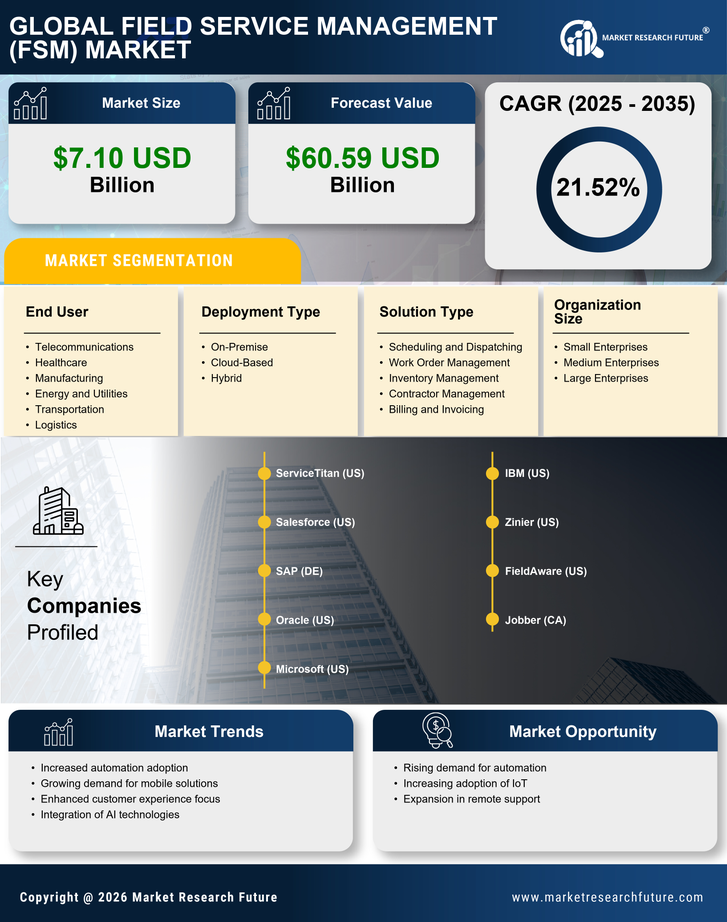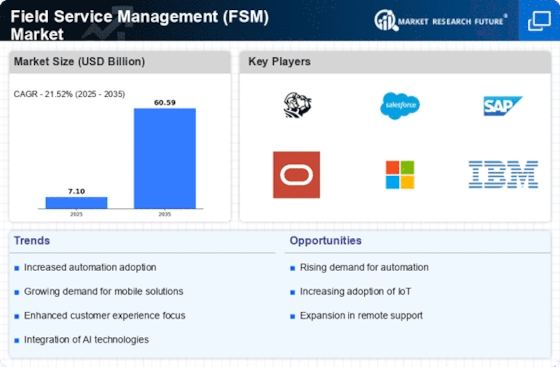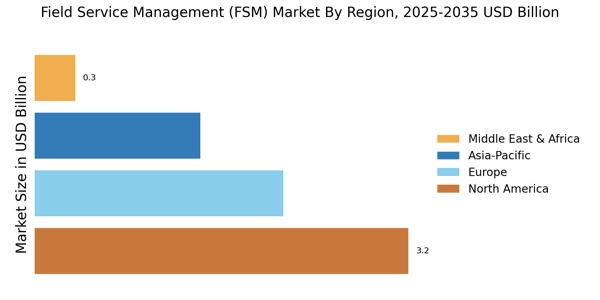This study complements existing field service reports by offering detailed segmentation, regional analysis, and long-term forecasts. Current field service management market trends highlight the growing importance of AI, automation, sustainability, and mobile workforce platforms. Key field service management trends include predictive maintenance, remote diagnostics, and cloud-first deployment strategies. Emerging field service trends indicate a shift toward proactive service models and customer-centric service delivery. The field service market size is expanding rapidly as organizations invest in automation, analytics, and mobile workforce solutions. This field service management market report provides comprehensive insights into market size, growth drivers, competitive landscape, and regional outlook through 2035.
The Field Service Management Market (FSM) Market is currently experiencing a transformative phase, driven by advancements in technology and evolving customer expectations. Organizations are increasingly adopting FSM solutions to enhance operational efficiency, improve service delivery, and optimize resource allocation. The integration of artificial intelligence and machine learning into FSM platforms appears to be a key factor in this evolution, enabling businesses to predict service needs and streamline workflows.
Furthermore, the growing emphasis on customer satisfaction is prompting companies to invest in tools that facilitate real-time communication and feedback, thereby fostering stronger relationships with clients. The field service software market continues to evolve with advanced scheduling, work order automation, and analytics-driven platforms. The field service software market size is expected to grow steadily as enterprises modernize service operations and customer engagement models. The adoption of remote field service software is increasing as organizations enable virtual diagnostics, remote assistance, and predictive maintenance capabilities. The field service industry is experiencing a transformative phase driven by digitalization, automation, and evolving customer expectations.
Across the field services industry, companies are investing in mobile technologies and AI-driven platforms to improve service responsiveness. In addition, the rise of mobile applications is reshaping how field service teams operate. Technicians equipped with mobile devices can access critical information on-the-go, which enhances their ability to respond promptly to service requests. This shift not only boosts productivity but also contributes to a more agile service model. As the FSM Market continues to evolve, it seems poised to embrace further innovations that will redefine service delivery and operational strategies across various industries. The broader field service market is undergoing digital transformation as organizations prioritize efficiency, automation, and real-time service delivery. The field service management software market is witnessing strong growth as cloud adoption and mobile workforce enablement accelerate across industries. The cloud field service management market is witnessing strong momentum as enterprises increasingly adopt SaaS-based FSM platforms for scalability and flexibility. The field service management software market size is projected to expand significantly, driven by increasing adoption of SaaS-based FSM platforms.
Increased Automation
The trend towards automation in the Field Service Management Market (FSM) Market is gaining momentum. Organizations are leveraging automated scheduling and dispatching tools to minimize manual intervention, thereby reducing errors and enhancing efficiency. This shift allows companies to allocate resources more effectively and respond to customer needs with greater speed.
Every modern field service business is prioritizing automation, mobile enablement, and predictive service models to enhance competitiveness. Enhanced field service data collection enables organizations to analyze performance metrics, optimize workflows, and improve service quality. References to the field service magic quadrant continue to influence enterprise software selection and vendor credibility. Independent field service management software ratings are increasingly guiding purchasing decisions among enterprises and service organizations.
Enhanced Data Analytics
Data analytics is becoming increasingly vital in the FSM Market. Companies are utilizing advanced analytics to gain insights into service performance, customer behavior, and operational bottlenecks. This trend enables organizations to make informed decisions, optimize service processes, and ultimately improve customer satisfaction.
The field service management industry is expected to benefit significantly from AI integration, IoT adoption, and cloud-based service platforms. Each field service organization is increasingly focusing on workforce optimization, training, and digital service execution models. The expansion of global field services is being driven by multinational enterprises seeking standardized service delivery and digital platforms.
Focus on Sustainability
Sustainability is emerging as a significant consideration within the Field Service Management Market (FSM) Market. Organizations are exploring eco-friendly practices, such as reducing travel emissions and optimizing resource usage. This focus on sustainability not only aligns with corporate social responsibility goals but also appeals to environmentally conscious consumers.


















